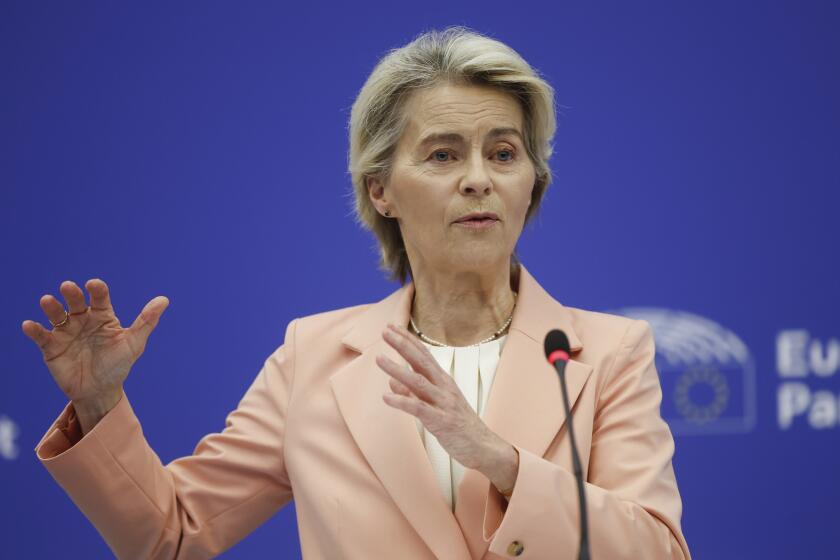Clashes raise fears of civil war in Somalia
Clashes between Islamic fighters and Ethiopian-backed government soldiers heightened fears Wednesday that Somalia is inching toward a civil war that could drag in the entire Horn of Africa.
As international negotiators worked furiously to resolve the dispute, armed battles around Somalia’s transitional capital of Baidoa killed at least one government soldier, according to Somali officials.
Islamic leaders, who seized control of Mogadishu, the traditional capital, and much of southern Somalia from warlords this summer, are calling for a “holy war” against Christian-dominated Ethiopia unless the neighboring nation withdraws its troops, which were sent across the border to prop up Somalia’s weak transitional government.
Both sides have been massing weapons and troops in strategic points around southern Somalia in recent weeks.
It remained unclear who started Wednesday’s fighting, but officials said skirmishes were ignited by a gunfight between two rival reconnaissance missions in the town of Idale, about 40 miles southwest of Baidoa, where Somalia’s transitional government is based. Fighting spread to two other areas.
“We captured two technical vehicles [converted 4x4s with mounted heavy guns], killed nine soldiers from their side and have prisoners in hand,” said Mohammed Ibrahim Bilal, a senior Islamist military official, speaking via telephone from the front line. “In the coming hours, Baidoa will be under our control. We will clean Ethiopians from our soil.”
The transitional government’s assistant defense minister, Salad Ali Jelle, said only one of his forces’ soldiers was killed.
Islamic Courts Union leader Sheik Hassan Dahir Aweys shed his usual religious robes for military fatigues Wednesday and spent much of the day monitoring the fighting, witnesses said. But by Wednesday evening, after meeting with European Union negotiators, he downplayed the skirmishes.
“The war has not started,” he told reporters. “Fighting is happening, but it is not between Islamic courts and the government. It’s between Islamic courts and Ethiopian invaders.”
The Islamic Courts Union is an alliance of religious leaders and their militias that formed to restore order to Somalia. The country has been beset with internecine fighting between warlords since the 1991 collapse of the Mohamed Siad Barre regime, the country’s last functioning government.
European Union Development Commissioner Louis Michel flew to Somalia on Wednesday to meet separately with leaders from the Islamic Courts Union and the transitional government, urging them to participate in a fourth round of peace talks, which are being mediated by the Arab League in Khartoum, the Sudanese capital.
At a news conference in Mogadishu, Michel announced that both sides had agreed to pursue mediation rather than war. Michel called the agreement a “breakthrough.... I believe that there is a chance to be able to relaunch the political dialogue.”
Experts nevertheless warn that renewed war in Somalia remains a risk and fighting could draw in its neighbors, including Eritrea and Kenya. A recent U.N.-commissioned study said that numerous nations already were sending fighters and guns to fuel the conflict.
“Everyone who knows something about Somalia knows that a real fight could easily spread to the region,” said Mario Raffaelli, Italy’s special envoy for Somalia.
Ethiopian and U.S. officials accuse the Islamists in Somalia of having links to terrorism and say the courts union seeks to install a Taliban-style regime. In her most blunt assessment yet, Assistant Secretary of State for African Affairs Jendayi E. Frazer last week accused the Islamic union of being controlled by “East Africa Al Qaeda cell individuals.”
Islamists dismiss such allegations as Western propaganda, though some concede that the union is struggling to strike a balance between its moderate and fundamentalist factions. One extremist sect is accused of masterminding the September killing of an Italian nun in Mogadishu.
Though Islamist leaders in Mogadishu have won praise from residents for restoring peace and order to the city, the rise of the courts union has stirred anxiety in neighboring Ethiopia. Somalia and Ethiopia have repeatedly gone to war over the years, often over a contested swath of land known as the Ogaden, in eastern Ethiopia. Some Somalis have made no secret of their desire to create a “Greater Somalia,” including parts of current-day Ethiopia and Kenya.
In the 1990s, Aweys helped run an Islamic network in Somalia known as Itihaad al Islamiya, which was responsible for several terrorist bombings in Ethiopia.
The United States has taken a largely hands-off policy toward Somalia since 1993, when 18 American servicemen were killed during a failed raid in Mogadishu later chronicled in the book and film “Black Hawk Down.” In recent years, however, the U.S. government began quietly funding some warlords as part of the war on terror. Earlier this year, U.S.-backed warlords were chased out of Mogadishu by Islamic soldiers.
*
Times staff writer Sanders reported from Nairobi, Kenya, and special correspondent Albadri from Mogadishu.
More to Read
Sign up for Essential California
The most important California stories and recommendations in your inbox every morning.
You may occasionally receive promotional content from the Los Angeles Times.










